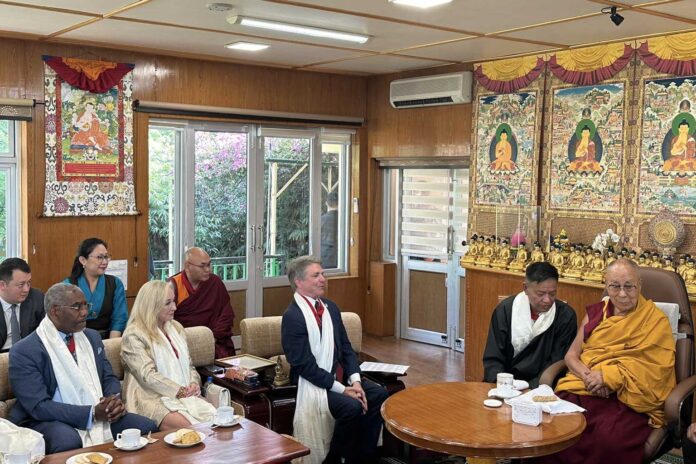In a move that symbolises huge geopolitical headwinds for the Indo-Pacific, a high-powered bipartisan US Congressional Delegation is currently on a two-day visit to India, and has met with His Holiness The 14th Dalai Lama in Dharamshala.
The Dalai Lama is the spiritual and civilisational leader of the Tibetan People and has been living in exile in India since 1959, after China forcibly captured Tibet.
The visit is seen worldwide as a major signal of US bipartisan support for the Tibetan issue, which has been a core red line for the Chinese Communist Party (CCP). In the past, Beijing has vehemently opposed any move which supports Tibet or the Dalai Lama.
The bipartisan US delegation is led by Republican Chair of the House Foreign Affairs Committee, Michael McCaul and includes former House Speaker Nancy Pelosi. They are joined by House members Gregory W. Meeks, Jim McGovern, and Ami Bera, and Representatives Mariannette Miller-Meeks and Nicole Malliotakis.
Before meeting the Dalai Lama, McCaul described Tibetans as “democracy-loving” people saying, “I am honoured to have the opportunity to meet with His Holiness, the Dalai Lama. Tibetans are a democracy-loving people who wish to practice their religion freely. This visit should highlight the bipartisan support in the US Congress for Tibet to have a say in their own future.”
The visit comes days after the US Congress approved the ‘Tibet policy bill’ which questions China’s claims over the Tibetan region. The bipartisan bill seeks to counter Beijing’s narrative about China’s control over Tibet. It seeks to promote dialogue between the Chinese government and the Dalai Lama and is currently before US President Joe Biden for his presidential approval.
Earlier, the US House of Representatives, in a clear majority of 391-26 votes, passed the ‘Promoting a Resolution to the Tibet-China Dispute Act’. The Senate had already passed the bill last month. After becoming an act, the bill will direct funds to counter what it calls “disinformation” from Beijing about Tibet’s history, people and institutions.
Even as the visit takes place, there is anticipation of a strong response from China over the US delegation meeting with the Dalai Lama. Beijing has already issued a strong worded statement on the visit, saying, ‘We are gravely concerned over the relevant reports and urge the US side to fully recognize the anti-China separatist nature of the Dalai group.’
Notably, in late 2022, then-House Speaker Pelosi visited Taiwan, despite repeated warnings by the Chinese government against contact with the self-ruled island which Beijing claims as its own. The meeting put diplomatic relationships between US and China in deep freeze. Since then, China has expanded its military exercises around Taiwan and has issued threats against the Island nation.
Through approval of the US Delegation visit, New Delhi has made its intent clear – that it will only respect Chinese core issues if China reciprocates and does the same for India – perhaps signalling the beginning of a new diplomatic spat between the two nations.
It is to be noted that the Indo-China bilateral relationship has been in an abnormal trajectory since 2020, when the Chinese PLA clashed against the Indian Army in Ladakh, as they tried to capture Indian territory in the Himalayas.










